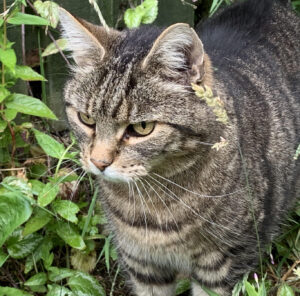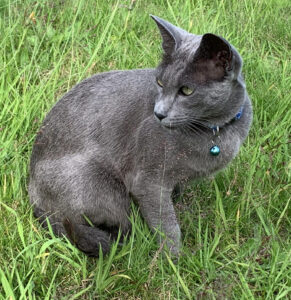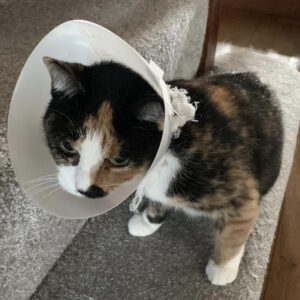Cats are adventurous, curious animals and this can often lead to them getting into difficulties and causing injuries, especially if they are outdoor cats. It is important that you do regular health checks on your pets and get to know what is ‘normal’. Therefore, any changes in their appearance or behaviour can be spotted quickly and Vets advice sort if concerned. As a cat sitter in West Lothian, I take my responsibilities of your pet’s health and welfare very seriously.

I have been completing a Distance Learning course on Animal Care through the SRUC and have learned lots of interesting new facts. Some of the information covered has been on getting to know your pets and recognising signs that your cat could be unwell, stressed or has been injured. https://alicatpurrfections.co.uk/alicat/auntie-ali-and-her-ongoing-feline-studies/
Signs which indicate that your cat is normal and healthy:
- No lameness
- Alert reflexes
- Faeces normal
- Appetite normal
- Clean, bright eyes
- No nasal discharge
- Stable alert posture
- Urine passed normally
- Clean, odour free ears
- Glossy coat, tidy plumage
- Teeth clean and free from decay
- Mucous membranes normal colour
- Vulva or penis free from discharge
- Temperature, pulse and respiration normal
- Mouth firm, free from swelling, cuts, smell and vomit
- Feet free from sores, swellings, and foreign bodies, with short nails
This is a fairly comprehensive list of the signs of good health. Animals are all different in both looks and temperament. Therefore you have to recognise what is normal for the age and breed of your cat(s).
PREVENTION IS BETTER THAN CURE. You should always consider preventative treatment for animals in your care. This is so you can recognise abnormal behaviour quickly. Getting to know your cat(s) will help you to notice when something is not quite right. Observation is a very important part of preventative care.
Two routine treatments that help to maintain an animal’s health and wellbeing are Flea and Worming treatment.
Vaccination is also part of preventative care. It can protect an animal against a possibly fatal disease. Cats should receive their initial course of vaccine at an early age usually recommended around 9 and 12 weeks old, then annual there after.

There are a number of signs your cats may exhibit when stressed or in pain. Remember cats are very good at hiding illness, as in the wild this would make them vulnerable to prey, so can be difficult to spot. This will vary between each cat, so use your observation skills. The following are possible signs of stress or pain:
- Pacing
- Pupils dilated
- Increased heart rate
- Unusual body position
- Not eating or drinking
- Increased body temperature
- Unwilling to move or exercise
- Crying, whimpering, vocalisation
- Increased breathing (respiration) rate
When an emergency happens you must think quickly. Here are some key points to remember:
- Ensure the safety of yourself and others
- If there is a risk of biting use a suitable restraint. If you do get bitten, see your doctor ASAP
- Keep calm and assess the situation
- Do not offer food, drink or medication
- Contact the vet and act on advice. If you have to take the cat to the vet drive carefully
- Ensure all information given is accurate
After ensuring safety you must evaluate the situation. Different situations will require different approaches. Some examples of these are:
Very severe – Act immediately or the animal may die
- Breathing has stopped (pulmonary arrest)
- Bleeding (haemorrhage) from a main artery
- Cardiac arrest – no pulse, the heart has stopped
- Obstruction in the airway due to foreign body e.g. a stick/bone
- Acute allergic reaction e.g. to medication or an insect sting
Severe – Act within one hour or animal may die
- Considerable blood loss
- Shock (circulatory failure)
- Head injuries e.g. Road Traffic Accident (RTA)
- Breathing difficulties e.g. trauma to the chest wall
Serious – Act within 4-5 hours or situation may become lifethreatening
- Spinal injuries
- Early stages of shock
- Bone fractures visible through the skin
- Difficulty giving birth (dystocia) e.g. prolonged straining
Major – Act within 24 hours to prevent deterioration
- Fractures with no skin injury
- Prolonged vomiting and diarrhoea
- Foreign bodies in the eyes or ears e.g. grass seeds
There are many causes, signs, and first aid treatment; here are some of the common situations which may happen:
- Wounds – An injury caused by a cut or impact which breaks the skin. There are three types of wound:
- Open – the broken skin has exposed underlying tissues and there is bleeding. There is high risk of infection.
- Closed – the skin is not broken. The injury can range from slight bruising to serious internal damage. The wound is not visible so blood loss cannot be assessed.
- Abrasion – the surface skin has been broken to expose the underlying layer. There is often light bleeding.
- Contused – broken blood vessels under the skin causing discolouration i.e. a bruise. This is normally caused by impact.
- Treatment of Wounds:
- Open
- Control bleeding
- Clean the wound
- Dress the wound.
To clean the wound flush as soon as possible after injury. This helps to remove harmful bacteria and foreign material e.g. hair, saliva or grit. Use warm water or sterile solution.
Do not use antiseptic solutions because they can be harmful to delicate body tissues. Exceptions are puncture wounds and bites.
To dress the wound use a sterile non-adhesive dressing and a light bandage. This will protect the wound and prevent contamination.
- Closed
Use a cold compress to relieve pain and reduce swelling.
Crushing injuries may result in damage to internal organs. Seek veterinary help immediately.

Many cats will lick their wounds and sore skin. Some will chew the bandages and lick the damaged area. To prevent the animals licking, chewing and scratching it is a good idea to use a Buster collar (Elizabethan collar) – like a lampshade or apply a Bitter spray – the taste deters them.
There are lots of things that can happen to our fur babies on a daily basis. When your pets are in my guardianship while you are away, I always take time to observe and check that they are safe, well and happy. Cat Sitting is a big responsibility and owners trust me with their precious pets. Alicat Purrfections cat sitting service always ensures your cats receive the very best of care on every visit.

